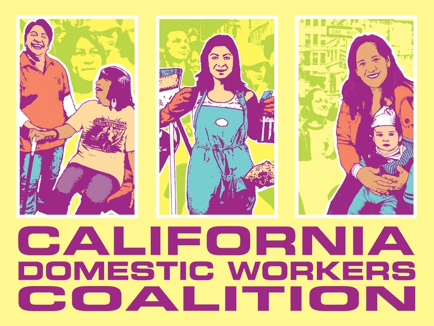NANNIES HAVE RIGHTS ON THE JOB!
If you work in a private home and care for children doing tasks like supervising, playing, teaching, feeding, bathing, or dressing, and if no more than 20% of your workweek is spent on general housekeeping duties, like cleaning, cooking, laundry, or making beds, then you are considered a “personal attendant” under the law, and you have rights.
Below are some of the most important rights you have as a personal attendant. No matter what your immigration status is, all immigrants have rights as workers. Whether or not you have papers to work or are paid in cash, you have the right to claim the wages you are owed and to speak up about your rights.
You have the right to be paid at least the minimum wage for all hours worked*:

This hourly minimum wage is higher in many cities, like Los Angeles, San Diego, San Francisco and Santa Rosa. Please refer to this minimum wage tracker to see if the city you work in has a higher hourly minimum wage: tinyurl.com/minwageCAcities
You have the right to overtime*:
- Nannies who do not live in the home of their employers and all nannies hired by an agency have the right to: 1.5 X regular hourly rate for work after 9 hours in a day and after 40 hours in a week.
- Nannies who live in the home of their employer and are hired directly by the family have the right to: 1.5 X regular hourly rate for work after 9 hours in a day and after 45 hours in a week.
- Here is an example of how to calculate overtime: If you are regularly paid $16 an hour, overtime pay would be 1.5 X $16= $24 per hour.
*Casual babysitters who babysit occasionally and not as their regular job, and babysitters under 18 do not have the right to overtime.
**Certain childcare providers working with families who receive state child care funds are not covered under overtime laws or only have the right to weekly overtime after 40 hours.
You have the right to paid sick leave:
- You earn 1 hour of paid sick time for every 30 hours worked for your employer. You can begin using paid sick time after a period of 90 days from your employment start date.
- You can use sick timeleave if you get sick or injured; to care for an ill family member; to attend a medical appointment for you or family member; or to get services or legal help if you are a victim of domestic violence, assault or stalking.
- Your employer may limit your use of paid sick time per year to 24 hours or 3 days, whichever is more.
You have the right to workers’ compensation to cover medical expenses or lost wages if you become sick or get injured at work:
- You can file a claim for workers’ compensation if you worked at least 52 hours for your employer within the 90-day period before your injury and earned at least $100 within that period. Report your illness or injury to your employer immediately and if you get treatment, notify the doctor that this is a work-related incident.
You have the right to be paid on time:
- Pay is due twice a month.
You have the right to be paid for all of your wages if you are fired or quit your job:
- If you are fired, you should be paid immediately.
- If you quit and give 72 hours notice, you should be paid on your last day of work.
- If you don’t give 72 hours notice, then you should be paid within 72 hours of quitting
- If you are not paid all of your wages at the time you are fired or quit, you can get waiting time penalties, which is your daily average wage for each day that you are owed wages, for up to 30 days.
You have the right to protection from harassment and from being retaliated against for standing up for your legal rights:
- It is illegal for an employer to sexually harass you. If you are experiencing harassment or physical abuse because of your race, ethnicity, religion, sexual orientation and/or disability, contact the California Domestic Workers Coalition or the California Department of Fair Employment and Housing.
- It is illegal for an employer to threaten you, fire you or call immigration or the police on you for exercising your workplace rights or if you take time for services or relief as a victim of sexual assault or of certain crimes.
Keeping Records is Key to Defending Your Rights:
- It is important to keep records for days and hours worked, any breaks you took and wages paid as proof in case your rights are violated.
- If you are harassed, write down details including dates, time, location, and what happened.
- You should also keep track of how much time you spend doing housework in a workweek. If you spend more than 20% of your total workweek on housework (cleaning, cooking, laundry), you have different overtime rules and have the right to meal/rest breaks.
There are various State and Federal agencies that protect these workers’ rights and more. Please talk to an advocate with the California Domestic Workers Coalition to figure out how you can make sure your rights are upheld and respected.
